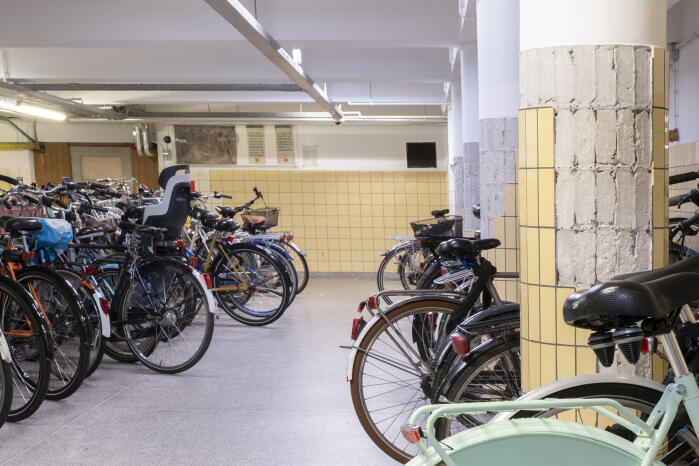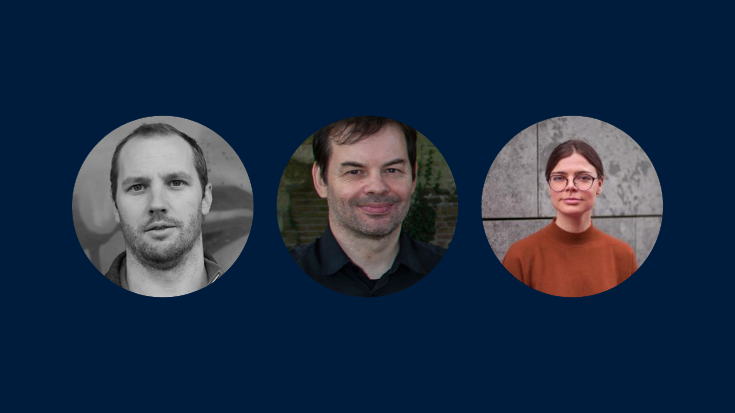Philanthropic foundation collaborates with SBE students to develop a matchmaking platform for non-profit sector
Matchmaking can be defined as connecting two people together to initiate a romantic relationship. Today, hundreds of companies exist that offer this type of service: Tinder, eHarmony, Okcupid are just some examples. Now, what if we could use the same mechanisms behind these popular dating apps to help connect philanthropic foundations with projects and organisations in need of funding?
This is exactly the idea behind Fundii, a platform that is being developed by SBE Professor Paul Smeets together with Valette Capital and the Maastricht based philanthropic foundation the Elisabeth Strouven Foundation. To help them develop the platform, the Fundii team collaborated with two SBE master students, Esther Njoroge and Stan Van Haren, who carried out explorative research as part of their master thesis.

Stan and Esther (on the left) with their supervising team

The idea behind the Fundii platform
Over the past few years, the Elisabeth Strouven Foundation came to notice the gap between philanthropic organisations like their own and promising non-profit organisations in need of funding. Paul explains: ‘Lots of people have great ideas for projects that aim to benefit society at large. Whether the focus is on reducing poverty, cultural activities or preserving nature. Yet, often these people do not know where to get funding for their idea. The online funding platform that we are developing together with the students will help those in need of money for societal projects to find the right foundations. Similarly, foundations are looking for good projects to fund; our platform will help them select projects with greater effectiveness and the highest societal impact.’
Partnering with SBE students
Paul first met master students Esther and Stan in his course ‘Sustainable and Responsible Investments’. The two students were taking the course as part of their degree in Economics and Strategy in Emerging Markets. During this course, the two teamed up for a case competition in which their task was to design a fund that tackled one of the sustainable development goals (SDGs) while still making a financial return for potential investors. Together with two other teammates, they created a fund called the ‘Azima Water Tank Fund’ and won the competition.
Following this case competition, Paul reached out to Esther and Stan to find out if they would be interested in working on the Fundii project with him and his team from Valette Capital and the Elisabeth Strouven Foundation. Their project later evolved to become both students’ master theses.
When asked about their initial thoughts regarding the project, Esther responds: ‘The idea of participating in a project that is a trendsetter in its own right was my main driving force to this project. Once I heard that the idea is to develop a tinder-like platform for the non-profit sector, I had to be part of the ground floor of the development.’
Stan approached the project with similar enthusiasm: ‘We could simply not pass up on such a wonderful opportunity which sounded so interesting. Moreover, for me personally I thought it would be a unique chance to work together with Paul Smeets on this project as he gave one of the most memorable lectures during my bachelor international business about happiness and money.’
For their thesis, Esther and Stan, under the supervision of Paul, collected data to confirm that there is sufficient demand for a platform like Fundii. Their goal was also to identify the specific needs for the platform from the user perspective. For this, Esther carried out semi-structured interviews with Dutch philanthropic foundations, while Stan did the same with local organisations in need of funding.

Making an impact outside the classroom
Both Esther and Stan were highly motivated by the idea that their research will serve a purpose outside of the classroom and that it has the potential to have a real impact on society. Esther explains: ‘I was very happy to be conducting research on something that would be implemented soon, as opposed to working on something hypothetical. The potential for this platform is boundless. The solution itself is very revolutionary. It will result at a minimum in effective resource allocation in the non-profit sector, offering donors the highest value for their money. Above all, I expect that this solution will go a long way in improving the network building process in the sector, opening up new avenues for projects to access funding they would otherwise have not received.’
Stan: ‘I hope this thesis will provide a good starting point for people that want to research market efficiencies and effectivity of charitable project funding. I think this is quite a new research topic, which definitely shows potential for further research. I hope that my thesis will also be useful for the Fundii platform so barriers for charitable project funding will be lower and accessibility of capital for doing good improves.'
What next: plans after graduation
When asked what both (now former) students have planned now that they recently graduated, Esther answers: ‘At the moment, my plans are still in the nascent stage. I would like to gain some international experience, complementing my existing experience by exploring employment opportunities in The Netherlands. Maybe even participate in bringing this project to fruition. Anything is possible at this time. I believe there are some exciting times ahead.’
As for Stan, he explains: ‘COVID-19 has somewhat interfered with my original plans of traveling South-East Asia with my girlfriend for two months, which was unfortunate. Instead, I hope I will be able to find a job, save up some more money and hopefully travel for much longer than those two months when the coronavirus will finally be under control!'

Professor Paul Smeets has held the chair of Philanthropy and Sustainable Finance of the Elisabeth Strouven Foundation since the beginning of 2020. This chair focuses, among other things, on the development of a broader learning environment for philanthropic innovations and collaborations.
‘The Elisabeth Strouven Foundation and the School of Business and Economics are cooperating to create positive societal value for Maastricht and beyond. My professor chair in Philanthropy and Sustainable Finance is part of this cooperation. I think that the 2019 Nobel Prize in economics demonstrated how science and societal impact can go hand-in-hand. The team of development economists have done great work figuring out which projects are most likely to reduce poverty, improve health and increase well-being. We are using scientific insights to improve the effectiveness of the projects financed by the Elisabeth Strouven Foundation and other foundations in the Netherlands. We have the dream to create an international funding platform, also reaching emerging markets that will maximize the social impact of donations.’ Paul Smeets
Also read
-
The Grote Gracht is richly lined with historical buildings that conceal remarkable stories. Once again, our “hidden gem” is located on this street in Maastricht, this time at number 76: the (bike) cellar.
-
In their NRO-funded project CO-PILOT of €25,000, Johan Adriaensen, Mirko Reithler and Robyn Ausmeier explore the potential of using Large Language Models (LLMs) as a scaffolding tool for in-class use.
-
De Nederlandse Organisatie voor Wetenschappelijk Onderzoek (NWO) maakte 17 juli jl. bekend welke onderzoekers de zogenaamde Veni-beurs krijgen. Deze beurs gaat naar veelbelovende onderzoekers uit de volle breedte van de wetenschap.


